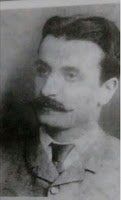New paragraph

Thomas Scott seems not to have travelled home in the first decade of 20th Century as might have been expected but he would return to Scotland on leave in 1912 and whilst there be told he was seriously ill. He would sail back to Brazil and the following February in Jundiai die and there be buried in the cemetery's only English-language grave. He was just forty eight.
By then his eldest son, John, aged twenty-five or so had moved to Sao Paolo. His mother, Helen and the four younger children, Robert, James, David and Archibald, joined him. Alexander and Hugh were seemingly elsewhere. But for Helen the move to the state capital proved fshort. She would die there in January 1914 not quite a year after her husband and the same age as he had been, her body was laid beside his in Jundiai and that might have been the end of story, footballing and otherwise. Certainly it seemed like it when Hugh left that same year for Britain to enlist. In fact Hugh Scott was to survive the war and returned to live in Brazil, but in Rio. Meanwhile football in Sao Paulo had been going through an explosive period, both in terms of growth and organisation, a period and subsequent embedding, of which John and several of the younger Scotts, not least through Britania F.C., were to be a part for almost the next two decades.
